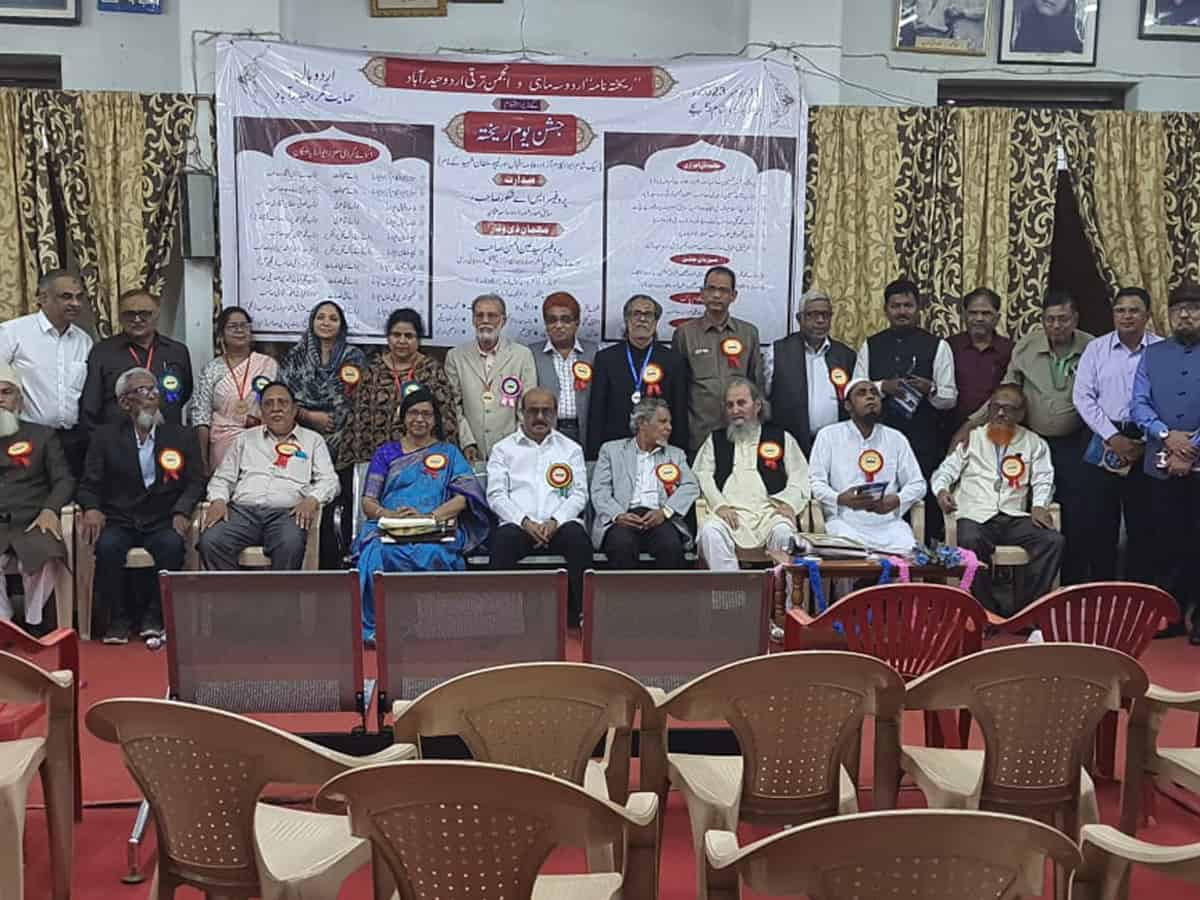
Hyderabad: In the midst of the clamor surrounding elections, Javeed Kamal stood apart, unwavering in his dedication to the promotion of the Urdu language. True to his name, he did a ‘kamal’ and orchestrated a remarkable event that drew together a diverse group of Urdu enthusiasts. Among them were professors, academics, journalists, and poets, converging to reflect on the current state of affairs concerning Urdu.
The occasion that brought these minds together was the joint celebration of the birth anniversaries of three distinguished personalities—Maulana Abul Kalam Azad, India’s first education minister, renowned poet Allama Iqbal, and the valiant Tipu Sultan, who fiercely resisted the advancement of British forces. As disparate as their fields of influence were, a common thread wove through their legacies—their profound love for their community and a deep attachment to the Quran.
The programme was organized by Javeed Kamal’s quarterly journal, Rekhtanama, and Anjuman Taraqqi Urdu, Hyderabad. Earlier, there was a bit of confusion when police mistook the programme to be an election meeting. The cops marched into the unassuming confines of the Urdu Hall at Himayathnagar and sought clarification from the event organizers about the nature of the gathering. The police officers were visibly relieved when they realized that they had stumbled upon a cultural affair rather than a politically charged meeting. Without a word, they silently withdrew from the auditorium, leaving the Urdu enthusiasts to continue their programme.
Speakers highlighted the indelible mark on India’s intellectual landscape left by Maulana Azad. His commitment to education as a means of societal upliftment mirrored his love for the diverse communities that composed the tapestry of the nation. Azad’s vision transcended political boundaries; he sought to empower the masses through the enlightenment of knowledge.
Allama Iqbal, the celebrated poet-philosopher, contributed significantly to the cultural and intellectual heritage of the Urdu-speaking world. His poetry resonates with profound spirituality, drawing inspiration from the teachings of the Quran. Iqbal envisioned a society where individuals, irrespective of their background, could find unity through a shared appreciation of their spiritual essence, the speakers said.
Tipu Sultan, the valiant warrior, symbolized resistance against colonial forces. His fierce determination to protect his people from British oppression emanated from a sense of duty rooted in his attachment to the Quranic principles of justice and freedom. Tipu Sultan’s legacy echoed the sentiments that love for one’s community could fuel the courage needed to confront formidable challenges.
Javeed Kamal’s initiative to commemorate these three iconic figures served as a poignant reminder of the enduring values that bind the Urdu-speaking community. The gathering provided a platform for introspection, discussion, and a renewed commitment to preserving and promoting the rich cultural and linguistic tapestry that is Urdu.
Students of Central Public School, Khilwat, paid a poignant tribute to Allama Iqbal. Attired in period costumes they recited the timeless verses of Iqbal’s poem, Ya Rab Dile Muslim ko wo zinda tamanna de, in the context of the challenges being faced by the community.
Several speakers, including Prof. S.A. Shukoor lamented the gradual detachment of Muslims from their own mother tongue. “What will be the future of Urdu after our generation? ”, wondered Prof Amina Teheseen of Moulana Azad National Urdu University.
The programme saw the exceptional contribution of individuals from different walks of life to Urdu being recognised. Mementoes and awards were given away to many an unsung hero. Some of the awardees were: Sufi Sultan Shattari , Tameez Ahmed Perwaz (Allama Iqbal award for poetry), Muhammad Osman Shaheed, Dr. Islamuddin Mujahid (Tipu Sultan award for oratory), Dr. Majid Daagi (Abdul Raheem Khan award for literature), Maulana Ghyas Ahmed Rashadi (Zaheeruddin Ali Khan award for social work), Mushtaq Ahmad Saharwardi, Dr. Shaikh Zeenat Parveen (Dr. Mumtaz Mehdi award for humour and satire), J.S. Ifthekhar and M.A. Majid (Maulana Abul Kalam Azad award for journalism).
The programme stood as a testament to the enduring power of language, culture, and shared values in transcending the noise of electoral politics. In celebrating the legacies of Azad, Iqbal, and Tipu, the Urdu enthusiasts not only honored the past but also kindled a flame of inspiration for the future of Urdu language and culture.
